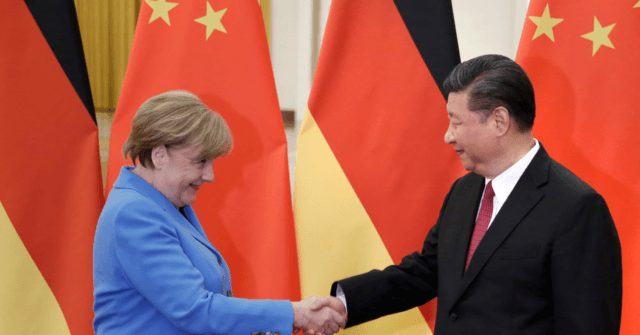
German Chancellor Angela Merkel called for a renewed push for the enormous EU-China trade deal in what is most likely to be her last discussion with Chinese dictator Xi Jinping as the leader of Germany.
Chancellor Merkel, who will be replaced after the German elections later this month, utilized among her final foreign policy conferences to continue her efforts to deepen trade relations in between the European Union and the Chinese Communist Celebration (CCP).
In a Chinese readout of the discussion in between Merkel and Xi, the German leader apparently informed the communist dictator that the EU-China investment offer– which was put on hold after Beijing imposed sanctions on European political leaders who spoke up versus the human rights atrocities in Xinjiang– would be mutually beneficial and a “win-win” for both China and the EU.
For his part, Xi Jinping thanked the German Chancellor for being “actively devoted to promoting Germany’s and the EU’s practical cooperation and friendly exchanges with China.
The EUR120 billion proposed trade offer came under fire for failing to point out problems of human rights in China, including the anti-democratic crackdown in Hong Kong or the oppression in Xinjiang, where it is thought that as many as three millionUyghurs have actually been put behind bars in prisoner-of-war camp.
The EU Commission hailed the deal for its supposed ‘concessions’ from the CCP, but in critical locations such as forced labour the dictatorship in Beijing has actually merely claimed it will “work towards” implementing global labour requirements.
Merkel Makes Clear That Germany Will Not Help U.S. in China Trade Battle https://t.co/mD8I0wy1gu
— Breitbart London (@BreitbartLondon) January 17, 2020
Throughout Merkel’s 16-year reign as the leader of Germany, her country has seen financial ties with the communist routine greatly increase, with China ending up being Germany’s leading trading partnerin 2018.
Today, German business such as Hugo Manager, Aldi, Lidl, and C&A were implicated by the European Centre for Constitutional and Human Being Rights (ECCHR) of benefiting off of the servant labour system in Xinjiang. The companies have denied the claims.
Germany’s leading automobile companies Volkswagen and BMW have actually also been implicatedof benefiting from using servant labour in the Xinjiang area.
It is unclear if Merkel’s pro-China policies will outlive her chancellorship, with her tipped successor as leader of the notionally centre-right Christian Democrat Union (CDU), Armin Laschet, trailing left-wing parties in the polls.
The director of the European Council on Foreign Relations’ Asia programme, Janka Oertel, told the Hong Kong-based South China Morning Post that Merkel “focused on enhancing and deepening trade relations with China, while hoping that the country would slowly adjust and incorporate into the rules-based worldwide order, made good sense at the time.”
Nevertheless, Oertel noted that this agenda runs out date offered the Maoist, authoritarian push under Xi Jinping, saying: “The Chinese leadership has actually specified its own decoupling and autonomy program, which is preserved in President Xi Jinping’s speeches and the party’s latest five-year strategy.”
Merkel’s China program has also come under fire from Germany’s public broadcaster Deutsche Welle, which ran a viewpoint piece on Thursday requiring an end to her “love affair” with China.
“For many years Berlin has mollycoddled China in the hope that billions of euros in investments would prompt it to avoid its authoritarian methods. Beijing’s belligerence shows the tactic has actually backfired,” wrote DW’s Ashutosh Pandey.
“With Merkel on her way out, Berlin must seize the chance and embrace a forceful position on China. Germany with its own traumatic history of Nazi crimes must look for to develop an alliance with like-minded nations, including the United States and Japan, to make Beijing pay for suppressing human rights,” he included.
European Union Pivots Towards Communist China After Biden’s Afghan Blunder https://t.co/SKMV1r4K0O
— Breitbart London (@BreitbartLondon) September 9, 2021
While there may be some pushback in Germany versus China must Merkel’s Christian Democrat Union stop working in the elections in two weeks time, there have already been signals in Brussels that the EU management still plans on looking for much deeper financial ties with Beijing.
In an interview on Wednesday, EU Council President Charles Michel stated that the bloc will not be “imprisoned” to the competition between the United States and China.
“There is no doubt that we share the same democratic values and the very same political design as the United States. At the exact same time, we need to develop– as Europeans– our own technique concerning China, which is a global power,” Michel wheedled.
“There is the rebalancing of relations in regards to trade and, more broadly, economics. In fact, this was the purpose of the draft arrangement on financial investments which was, in my opinion, a first step to rebalancing access to our respective markets,” he said in referral to the proposed trade handle China.
‘Problem for the Free World’: EU Trade Handle Communist China Draws Harsh Criticism https://t.co/CktU0dsAnG
— Breitbart London (@BreitbartLondon) January 5, 2021
Follow Kurt Zindulka on Twitter here @KurtZindulka

